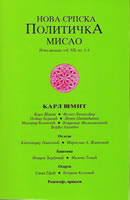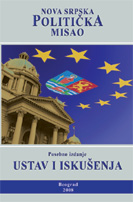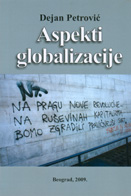| NSPM in English | |||
Neither Kosovo, nor Europe |
 |
 |
 |
| уторак, 24. фебруар 2009. | |
|
Now there are 54 states that recognize Kosovo, including 22 EU members; almost all of them are our neighbors and – with the exception of Bosnia and Herzegovina – all former Yugoslav republics have recognized it. There is EULEX and the Kosovo issue is gradually being moved out of UN jurisdiction and out of reach of the Russian veto. There is “Kosovo Security Force”, which is formed according to Martti Ahtisaari’s plan with active support from NATO. Barrack Obama congratulated the leaders of “multiethnic, independent and democratic Kosovo.” Dozens of European and world officials visit Kosovo and encourage local “democratic process” and “progress” whenever they visit the region. There are several official declarations and unofficial political statements encouraging Belgrade and Priština to co-operate and “develop neighborly relations.” And what is there on the other side? To say the least, the results are quite modest. The process of recognizing Kosovo is much slower than Priština and Washington expected. And the US had to put an unproportional amount of energy, and regarding the importance of this issue, almost an indecent amount of pressure, sticks and carrots into reaching the current number of countries that recognize Kosovo. The admission of Kosovo into international organizations – excluding financial ones; even the Serbian Government once proposed that Kosovo should become a member – is not going smoothly and it seems that even the incumbent political elite of Serbia will not be able or willing to make concessions about it. To be more precise, it seems that our side will not accept the presence of Kosovo delegations at conferences unless they have a modest UNMIK label even if the price we have to pay is leaving the event. And finally, our greatest diplomatic success is the majority of votes of the UN General Assembly supporting the decision that the case of Kosovo independence should be considered by the International Court of Justice. It is a significant point in the field of foreign policy for which we can thank the young and agile Foreign Minister and the atmosphere created by the recent conflict between Russia and Georgia. All in all, one party has received direct and painful blows and the other won just one battle conditionally; as it were, it is still an aim to be reached, a victory which is yet to be verified at complicated proceedings which will be taking place this year and the next. And that is the current score of the current “Battle of Kosovo” in which one side used its all political, material and spiritual resources and the other used “all diplomatic means” – the softest and most harmless ones. Therefore, let us not deceive ourselves. The results depend on how much effort each side put into it. None of Albanian officials declared “the status is does not matter, but how people live does.” There is not a single party at the deeply divided Kosovo political scene which would be ready to accept “peaceful reintegration” into Serbian political sphere. There is no Albanian politician who is not concerned about the danger posed by “division of Kosovo” and does not oppose slightest suggestions of Serbian autonomy North of the Ibar River. And I have not noticed that those who think that the independence of Kosovo and the process of European integrations are “equally important.” Naturally, Albanian leaders and citizens of Kosovo do not even consider this dilemma (“Europe or independence”) and there is no doubt about what their answer would be in that case. And what about Serbia? Of course, miracles happen. Therefore, it is not absolutely impossible that by a lucky chance things might change in the future. But now it is hard to imagine any other consequence on Serbian politics, especially a favorable one, than the one expressed by the phrase “neither Europe nor Kosovo.” And there is some justice in it. A nation unable to make a choice between territorial integrity and historic identity on the one side, and membership in an international association (although an important one) on the other, i.e. someone who cannot choose between these two “priorities” really deserves to lose both. (The balance of powers and choosing the means to fight for sovereignty and identity is a different question.) |
Остали чланци у рубрици
- Playing With Fire in Ukraine
- Kosovo as a res extra commercium and the alchemy of colonization
- The Balkans XX years after NATO aggression: the case of the Republic of Srpska – past, present and future
- Из архиве - Remarks Before the Foreign Affairs Committee of the European Parliament
- Dysfunction in the Balkans - Can the Post-Yugoslav Settlement Survive?
- Serbia’s latest would-be savior is a modernizer, a strongman - or both
- Why the Ukraine Crisis Is the West’s Fault
- The Ghosts of World War I Circle over Ukraine
- Nato's action plan in Ukraine is right out of Dr Strangelove
- Why Yanukovych Said No to Europe

.jpg)








 “If I forget you, Kosovo, may my right hand lose its cunning...” This paraphrase of an old Jewish proverb (which, by the way, proved effective) appeared on our cell phones about a year ago, and it is very likely to re-emerge for the first anniversary of Kosovo’s independence. Indeed, we have not forgotten Kosovo. But to be honest, we have not done much about it either. Not to mention that our new problems, starting with the elections, up to the economic crisis and the “Vojvodina Issue” announced two years ago have been diverting our attention to other topics.
“If I forget you, Kosovo, may my right hand lose its cunning...” This paraphrase of an old Jewish proverb (which, by the way, proved effective) appeared on our cell phones about a year ago, and it is very likely to re-emerge for the first anniversary of Kosovo’s independence. Indeed, we have not forgotten Kosovo. But to be honest, we have not done much about it either. Not to mention that our new problems, starting with the elections, up to the economic crisis and the “Vojvodina Issue” announced two years ago have been diverting our attention to other topics.












